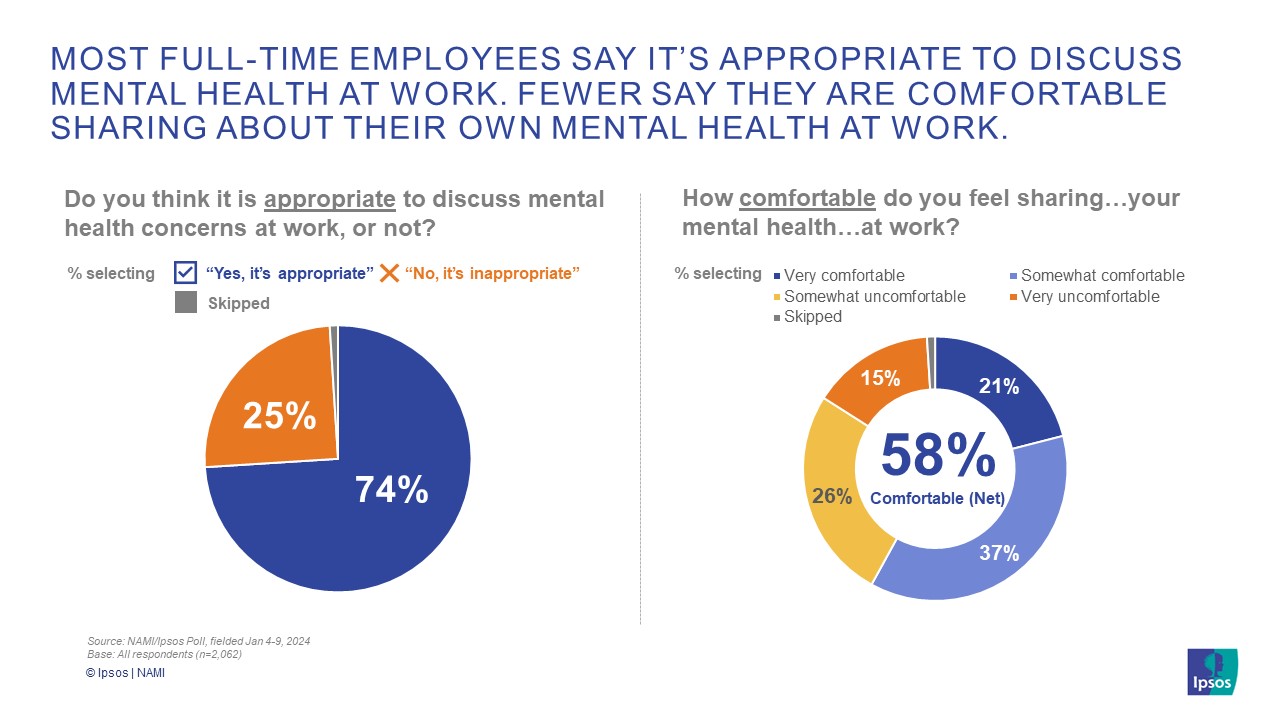Most employees say it’s appropriate to discuss mental health at work
Washington, DC, February 13, 2024 – A new NAMI/Ipsos poll of full-time employees* finds that while the majority of employees say it is appropriate to discuss mental concerns at work, significantly fewer say they are comfortable actually sharing about their own mental health while on the job. Employees who feel uncomfortable sharing about their mental health at work commonly cite stigma, lack of communication, and retaliation as key barriers. To foster a positive workplace culture, the vast majority of employees say mental health training and mental healthcare coverage would be or are beneficial. That said, employees who say their employer offers mental health training or coverage are more likely to say they feel comfortable discussing their mental health at work.
For more information about this study, please click here.

*Note: This study includes a nationally representative sample of 2,062 adults who are employed full-time and work at a business or company with at least 100 employees. Mentions of “employees” throughout this study refers to those who meet this criteria.
Detailed Findings:
1. There is a gap between employees’ perceptions of appropriateness discussing mental health in the workplace and actually feeling comfortable doing so.
- About three-quarters (74%) of employees say it is appropriate to discuss mental health concerns at work. Another three-quarters (77%) agree they would feel comfortable if their coworkers talked to them about their mental health at work.
- However, fewer employees (58%) say they would feel comfortable sharing about their own mental health at work.
- Among employees who say they would be uncomfortable sharing about their mental health at work, many cite stigma, lack of communication, and retaliation as key reasons why.
- A bare majority of employees (52%) report feeling burned out because of their jobs in the past year. However, employees who are less comfortable talking about their mental health at work are also more likely to report feelings of burnout and their mental health suffering due to work.
2. The vast majority of employees agree mental health training or employer-sponsored mental healthcare coverage is important for creating a positive workplace culture. Employees who say their employer offers mental health training or coverage are more likely to say they feel comfortable discussing their mental health at work.
- Four in five (83%) employees agree mental health and well-being training is, or would be, important in creating a positive workplace culture.
- Even more employees, nine in ten (92%), say employer-sponsored mental healthcare coverage is important for creating a positive workplace culture. This majority sentiment is held regardless of gender, age, stage in career, or managerial status.
- Employees whose employer offers mental health training or coverage are more likely than those who do not offer training or coverage to say it is appropriate to discuss mental health at work (81% vs. 68%, respectively), say they are comfortable with others sharing about their mental health at work (81% vs. 72%, respectively), or say they are comfortable sharing about their own mental health at work (65% vs. 50%, respectively).
3. Most employees believe employers are responsible for helping employees feel comfortable discussing mental health at work. While most managers agree they feel prepared to support the mental health of their direct reports, significantly fewer agree their company has provided them with the proper resources to do so.
- More than three-quarters of employees say supervisors, HR, and senior leadership should be responsible for helping employees feel comfortable discussing mental health at work (86%, 85%, and 78%, respectively). Only about half of employees say their employer offers or required mental health and wellbeing trainings or resources.
- Seventy-eight percent of direct managers (those who have at least 1 person reporting to them) agree they feel prepared to support the mental health of their direct reports.
- Significantly fewer direct managers, 63%, agree their company provides them with the proper resources to support the mental health of their direct reports.
4. Despite the expressed importance of mental health training and mental healthcare coverage for workplace culture, few employees or managers say they have received mental health trainings. One in four employees say they are unsure if their employer even offers mental healthcare coverage.
- Three in ten (29%) employees say they have received training about the mental health resources offered from their employer.
- Just 23% of executives or managers/directors say they have received training on how to talk about mental health with their teams.
- While 60% of employees say their employer offers mental healthcare coverage, 13% say they don’t offer it and 26% say they don’t know if they offer it. Entry-level employees are especially likely to be unsure if their employer offers mental healthcare coverage.
About the Study
This NAMI/Ipsos poll was conducted January 4-9, 2024, by Ipsos using the probability-based KnowledgePanel®. This poll is based on a nationally representative probability sample of 2,062 general population adults, age 18 or older, who are employed full-time and work at a business or company with at least 100 employees. This sample includes 106 executives. The 106 executives in the sample include an oversample of N=60 executives.
The margin of sampling error for this study is plus or minus 2.5 percentage points at the 95% confidence level, for results based on the entire sample of adults. The margin of sampling error takes into account the design effect, which was 1.4. The margin of sampling error for executives is plus or minus 11 percentage points at the 95% confidence level. This margin of sampling error for executives takes into account the design effect, which was 1.33. The margin of sampling error is higher and varies for results based on other sub-samples. In our reporting of the findings, percentage points are rounded off to the nearest whole number. As a result, percentages in a given table column may total slightly higher or lower than 100%. In questions that permit multiple responses, columns may total substantially more than 100%, depending on the number of different responses offered by each respondent.
The survey was conducted using KnowledgePanel, the largest and most well-established online probability-based panel that is representative of the adult US population. Our recruitment process employs a scientifically developed addressed-based sampling methodology using the latest Delivery Sequence File of the USPS – a database with full coverage of all delivery points in the US. Households invited to join the panel are randomly selected from all available households in the U.S. Persons in the sampled households are invited to join and participate in the panel. Those selected who do not already have internet access are provided a tablet and internet connection at no cost to the panel member. Those who join the panel and who are selected to participate in a survey are sent a unique password-protected log-in used to complete surveys online. As a result of our recruitment and sampling methodologies, samples from KnowledgePanel cover all households regardless of their phone or internet status and findings can be reported with a margin of sampling error and projected to the general population.
The data for the total sample were weighted to adjust for gender by age, race/ethnicity, Census region, education, household income, and executive status. The demographic benchmarks came from the 2023 March Supplement of the Current Population Survey (CPS). The executive status benchmark was calculated using screening data from the total sample.
- Gender (Male , Female) by Age (18-29, 30-44, 45-59, 60+)
- Race-Ethnicity (White/Non-Hispanic, Black/Non-Hispanic, Other/Non-Hispanic, Hispanic, 2+ Races/Non-Hispanic)
- Census Region (Northeast, Midwest, South, West) by Metropolitan Status (Metro, Non-Metro)
- Education (Less than High School, High School, Some College, Bachelor or higher)
- Household Income (under $25K, $25K-$49,999, $50K-$74,999, $75K-$99,999, $100K-$149,999, $150K and over)
- Executives (Yes, No)
About Ipsos
Ipsos is one of the largest market research and polling companies globally, operating in 90 markets and employing over 18,000 people.
Our passionately curious research professionals, analysts and scientists have built unique multi-specialist capabilities that provide true understanding and powerful insights into the actions, opinions and motivations of citizens, consumers, patients, customers or employees. Our 75 solutions are based on primary data from our surveys, social media monitoring, and qualitative or observational techniques.
Our tagline "Game Changers" sums up our ambition to help our 5,000 customers move confidently through a rapidly changing world.
Founded in France in 1975, Ipsos has been listed on the Euronext Paris since July 1, 1999. The company is part of the SBF 120 and Mid-60 indices and is eligible for the Deferred Settlement Service (SRD).ISIN code FR0000073298, Reuters ISOS.PA, Bloomberg IPS:FP www.ipsos.com



